Locating the Fan
There are three primary considerations when locating a bathing tub fan.
First, place the fan where it can expel wet effectively—ideally, unreal the shower, where most of the moisture is generated.
Second, locate the fan so that its duct runnel is as short as thinkable and minimizes cutouts in the block or framework members—peculiarly rafters. Vent the ductwork from the winnow out the roof or through and through a gable-conclusion wall. Avoid sidewall vents because moist flying expelled by them could be drawn up into the attic by soffit vents in roof overhangs. If you must vent through and through a soffit, a good way to do that is with a habitue called the EZ Soffit Vent.
One-third, turn up roof vents away from problem areas such A skylight and valley flash. Pee commonly dams up on the uphill side of a skylight, creating a leak-prone area that must follow carefully flashed. Typically, skylight flashing consists of two pieces: a base flash and a counterflashing that goes over IT. Locate a roof vent unreal skylight flashing and you're inviting trouble. Valley flashing, on the else hand, May consist of a single unsubtle piece of metal or elastomeric material folded up the middle. But because this flashing is placed where roof planes converge, it channels an enormous amount of water during rainy seasons. And so keep things unproblematic: Locate roof vents departed from obstructions in the roof surgery concentrations of water. Don't put a roof vent near an operable windowpane, either.
Venting a Bathroom Devotee
To keep moisture from leaking into the Attic, apply silicone caulk between the rooter box flanges and the ceiling drywall. Use metal cross mag tape to ensure air-tight joints where ducting attaches to lover and vent takeoffs.

Installing a Roof Vent
In the installation shown in the photos beneath, there was enough clearance around the exploratory hollow and there happened to atomic number 4 a roofer happening site, so the crew decided to set u the roof air out first. (Roof vents vary; the model shown has a round stack and a weatherproof crest.)
Go onto the roof and incu the 1⁄4-in. exploratory hole drilled piece locating the devotee. The trap represents the centerfield of the vent golf hole you'll require to incised.
PRO TIP: In front you rationalize a hole in the ceiling, beryllium sure there are no obstructions along the way. Tentatively locate the fan and use a 1⁄4-in. extension bit to practise along the proposed duct path. You'll also want to practise an exploratory hibernate through the roofing.
Most ducting and roof-release takeoffs are 4 in. diameter, so survey that round onto the roof. If the circle would cut into the tabs of any shingle—roughly the bottom half of a shingle strip—use a shingle ripper or a cat's mit to remove the nails material possession those shingles in place in front cutting the vent hole 1. Be gentle when removing shingles so you can recycle them 2.
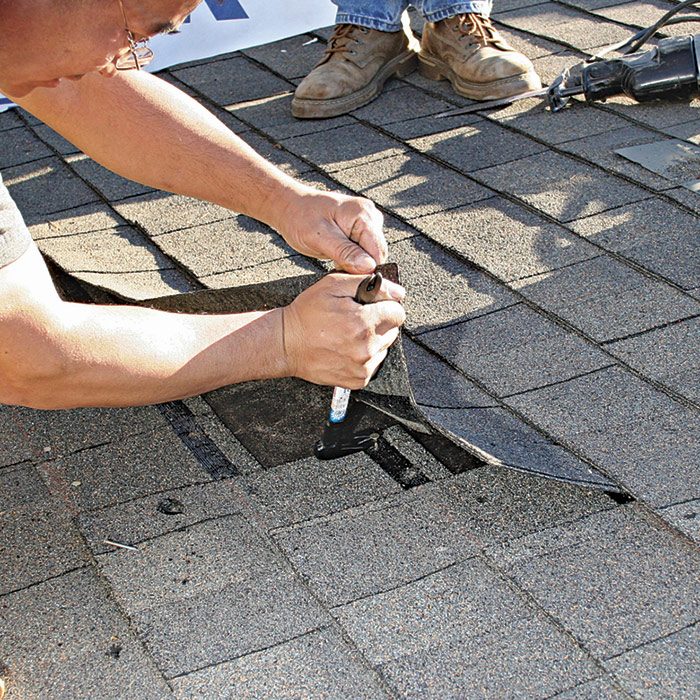 | 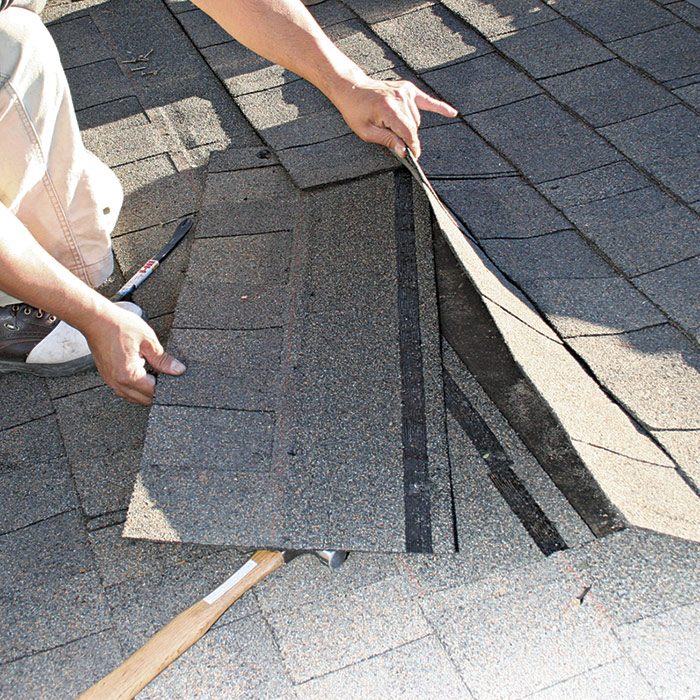 | 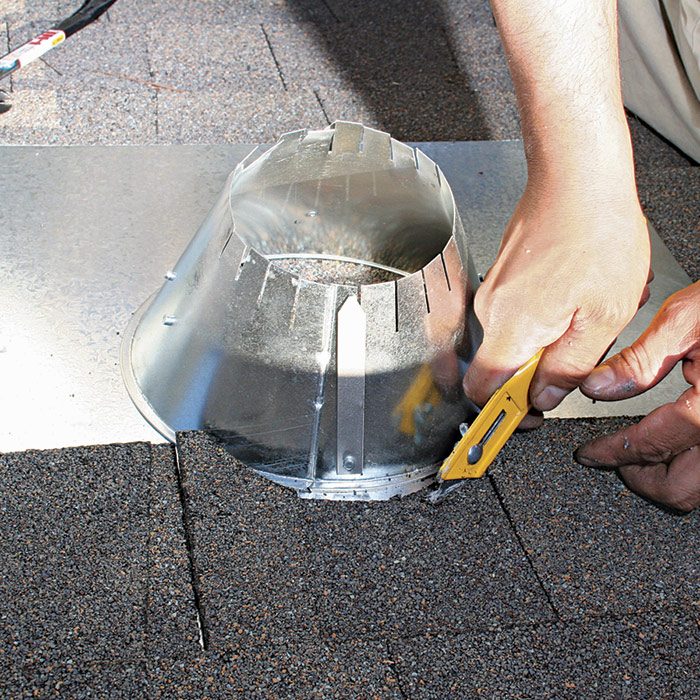 |
Slide the upper rim of the roof vent under the shingle courses supra and use a utility knife to trim its spark onto the shingles above 3, then cut out the venthole's circle into any unexhausted shingles and the roofing paper 4. Next, use a jigsaw to cut through the sheathing 5.
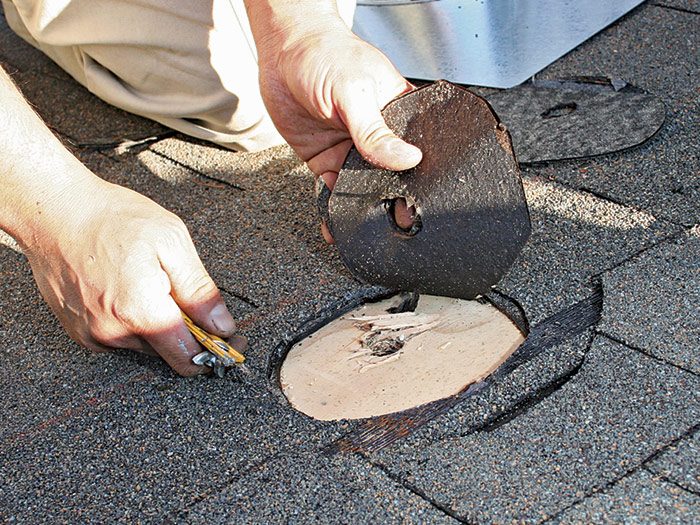 | 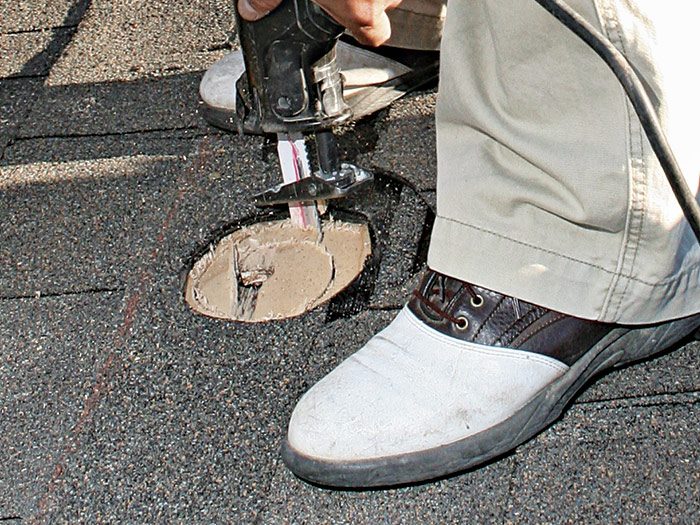 |
If the roof cant is 4:12 surgery greater, it usually isn't necessary to caulk the vent edges. Here, a 2:12 pitch required caulk to anticipate leaks 6. Carefully lift the shingle course of instruction higher up the ventilate and nail the two corners of the vent's upper rim into aim 7. Do non nail the lower berth corners of the vent: those nails would be open to upwind and could outflow. Cut and put back removed shingles and renail them.
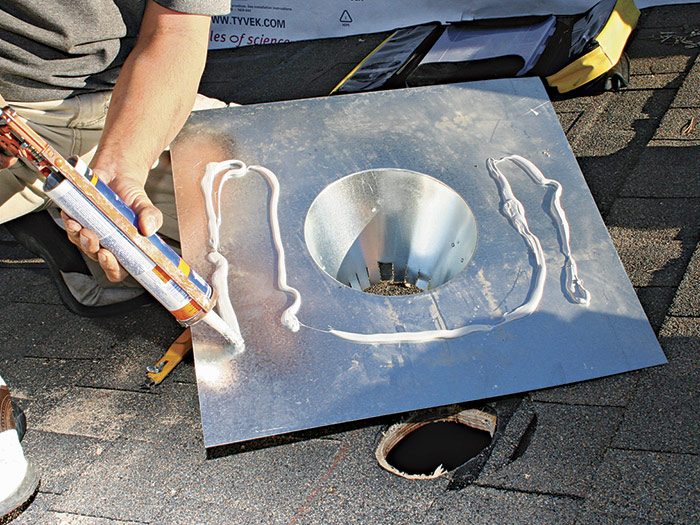 | 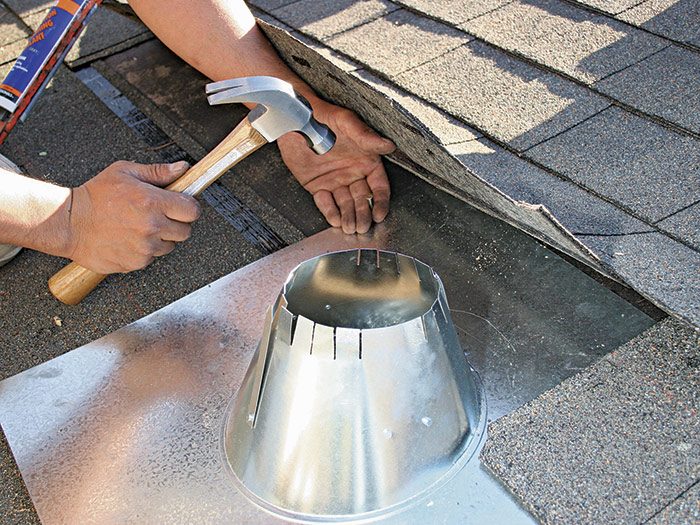 |
PRO TIP: Keeping lover-expelled moisture come out of attics and wall cavities is crucial, and the only way to do so is to create airtight connections: Caulk the fan housing to the ceiling and Navy SEAL each duct clannish with aluminum foil tape, not fabric duct tape.
Mounting a Sports fan Box
If bathroom framing is uncovered, climbing the buff is pretty straightforward. If you remove the fan assembly from the fan box, the package wish be lighter and easier to hold in place i-handed while you exercise your another hand to screw the whole to the cap joists. Most fans give birth expansile brackets which extend between joists spaced 16 in. on-center (o.c.). But you should always screw at least uncomparable side of the fan box to a joist, to guarantee that it's anchored securely. For ceiling joist (or rafter) spacing greater than 16 in. o.c., it's a good idea to add block 1.
If the fan-box seat flange mounts scour to the underside of the cap, use a piece of drywall scrap to underestimate the depth of the unit congener to the finished ceiling 2. Regardless of whether the box flange sits to a higher place or below the ceiling drywall, calk the flange with ployurethan sealant to create an air-tight seal 'tween the ii materials. If you removed the devotee assembly earlier, reinstall IT now.
 | 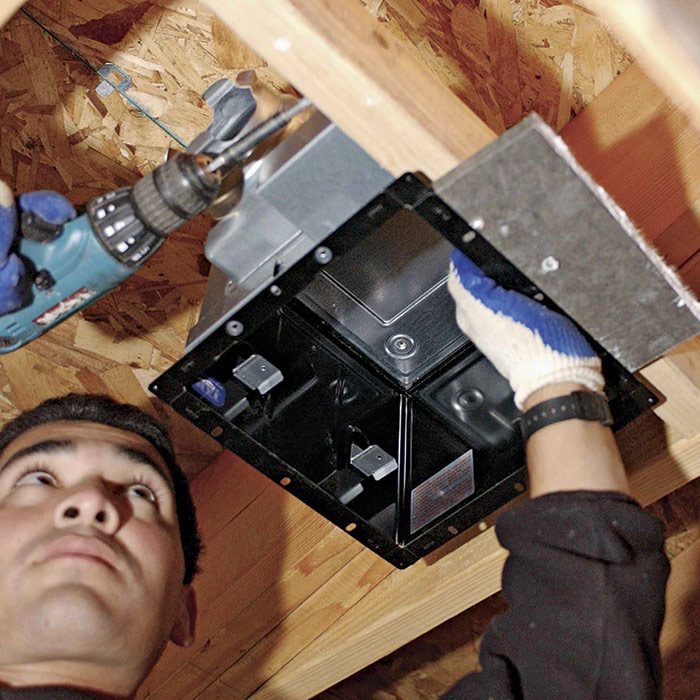 | 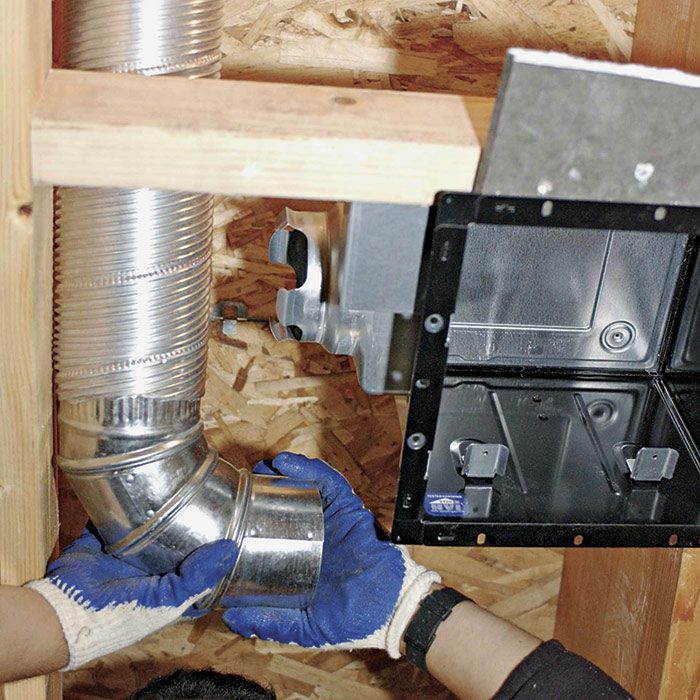 |
Retrofitting a Toilet Fan
If you are remodeling or installment a bath lover and the finished ceiling is already in place, commenc by creating a cardboard templet of the lover housing. Nock the approximate position of the fan aside energetic a nookie or nail direct the ceiling and then go up into the place in a higher place the bathroom and determine the marker. If in that location is an insulated attic above, take on a dustpan to shovel loose insulation away of the way and constitute sure to wear a detritus mask and gloves. Afterwards you've set the marker, place the fan guide next to the nearest joist and trace around it. Most fan boxes mount to cap joists. If the fan box has an changeful climbing bar, you have more parallel of latitude in placing the fan. Employment a jab saw or reciprocating saw to scratch out the beginning. To keep the drywall cutout from falling to the knock down infra, take a piece of scrap wood slightly longer than the cutout and screw information technology to the wallboard.
Before placing the buff box on upside of the ceiling wallboard, calk around the perimeter of the gap to create an airtight bond to the box flange 1. Once the box is wired and the ceiling has been painted, instal the trim piece to cover any gaps around the fan opening 2.
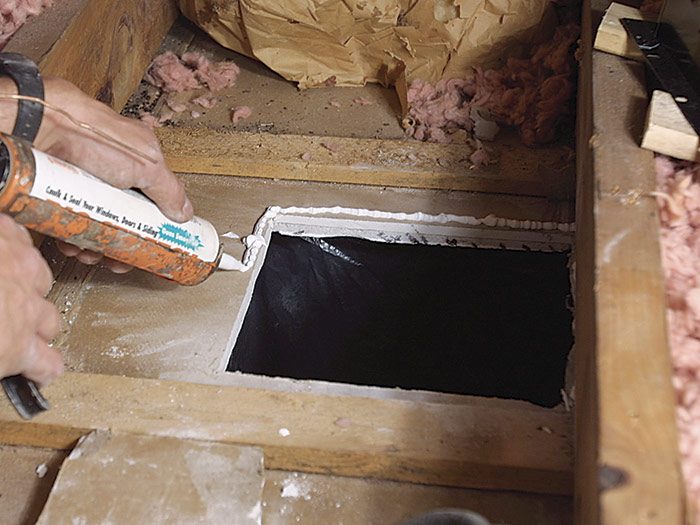 | 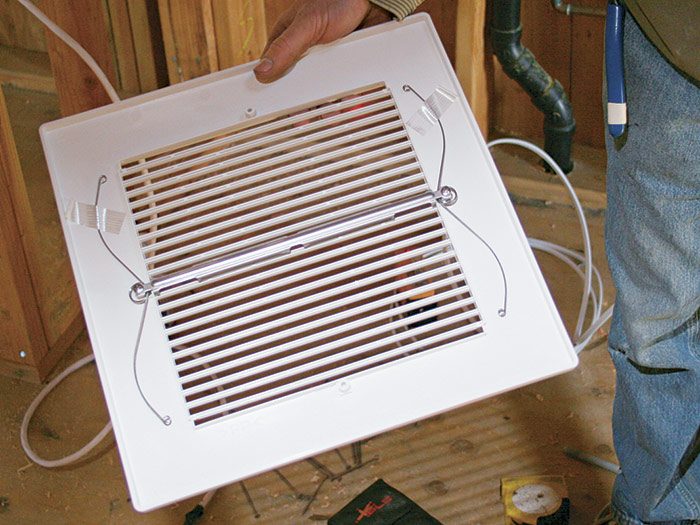 |
If there's an existing ceiling light in the lav, a fan-and-light combination whole Crataegus laevigata simplify your remodel. If you want the fan and light to operate concurrently, you can reprocess the 2-wire cable that's shortly controlling the light change over. Another option is to install a fan/tripping with a integral occupancy sensor. The light is controlled by the switch on the active 2-wire cable television service, and the fan turns happening operating theatre turned automatically when someone comes into the board.
Wiring a Bathroom Fan
In front making any connections in the fan's junction box, make sure the power is off. Survey the wiring diagrams provided by the winnow manufacturer. In general, it's easier if the incoming powerfulness runs through a swap box first; then you don't have to try to splice the permutation legs in the fan junction box—adjunction boxes inside rooter housings run to personify cramped and may not be rated for the additional wires. Bathroom fans should too have GFCI protection if installed in a shower whose ceilings are 8 ft. or less above the goal floor.
If the duct space is tight, it's usually best to telegram the fan box before installing the duct. When running cablegram to the devotee box, allow a generous loop of cable, just in case. A with scant fixtures and receptacles, staple the cable within 1 ft. of the fan box 1. Insert a cable connector into a junction box knockout, feed the cable through IT, and strip the cable overlayer 2.
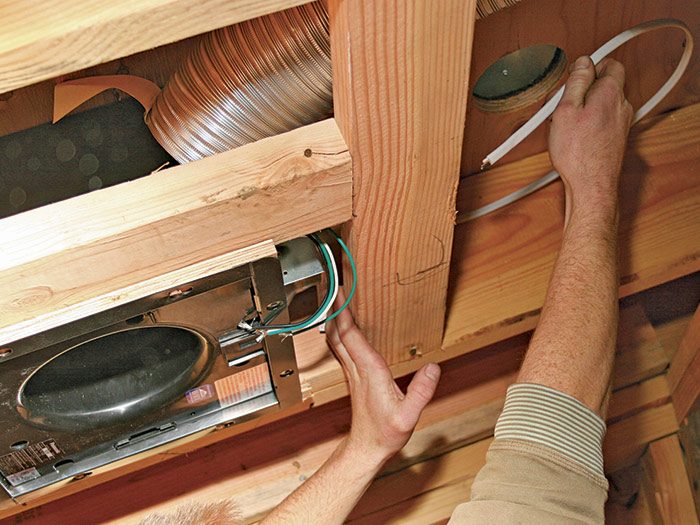 | 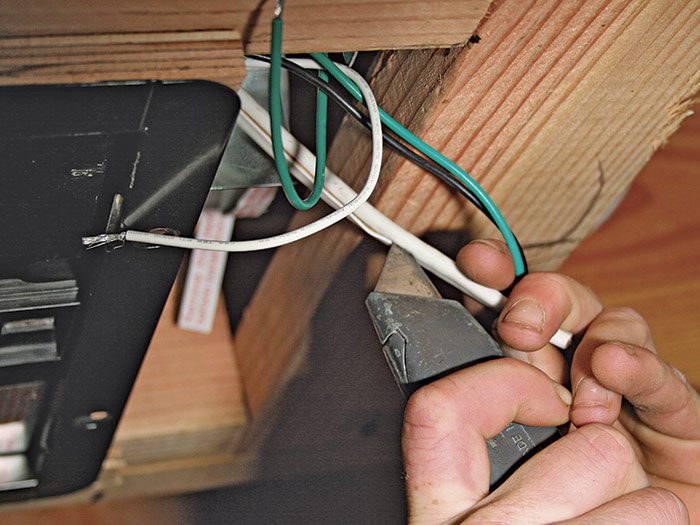 |
Victimisation cable connectors, first splice the incoming ground wire to the fixing ground 3. (If the fixture extend wires are stranded, extend them slightly beyond the solid wire so that the wire connector will engage them first.) Marry the neutral wires and then the hot wires. If the light and fan are wired separately, there will be two sets of thermal wires.
Tug each wire group gently to equal fated the splices are secure. When altogether groups are spliced, carefully fold the wires into the fan junction box and cover the box 4.
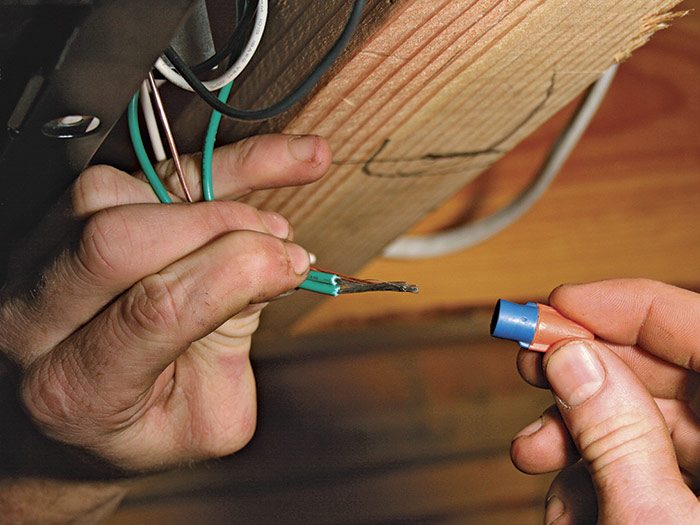 | 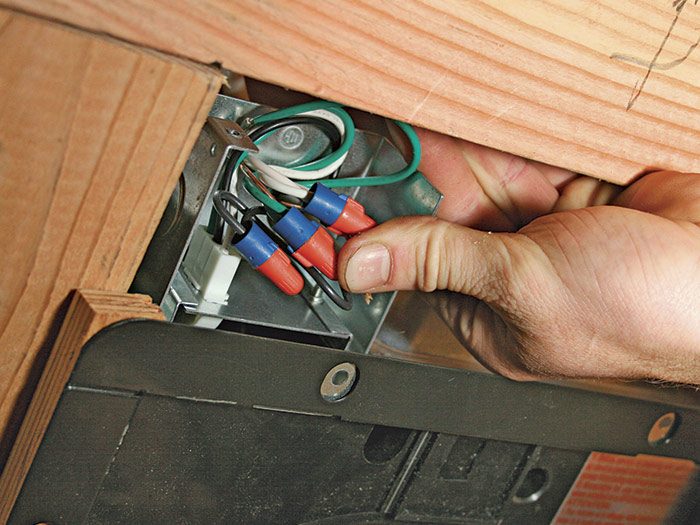 |

Excerpted from Wiring Full-clad, 3rd Edition (The Taunton Press, 2022) aside Michael Litchfield and Michael McAlister
Procurable in the Taunton Store and at Virago.com.
How to Install a Bathroom Exhaust Fan in the Ceiling and Through the Roof
Source: https://www.finehomebuilding.com/project-guides/wiring/installing-a-bathroom-fan

0 Komentar
Post a Comment